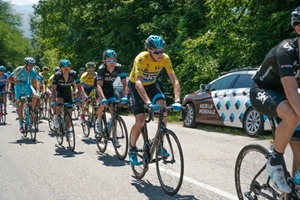 In the last few days of the race, the media buzz around the Tour de France reached a crescendo in the UK – not least because Team Sky’s champion rider Chris Froome was dominating the race, and the chances for others to put the brakes on him were narrowing. In an unprecedented move, Team Sky released Froome’s physiological “power data” to enable “a greater understanding of his performance”, following accusations that his advances in stage 10 of the race were beyond normal physical abilities. The data revealed that the speed with which Froome achieved the daunting climb to La Pierre-Saint-Martin in stage 10 was exceptional, but well within his means.
In the last few days of the race, the media buzz around the Tour de France reached a crescendo in the UK – not least because Team Sky’s champion rider Chris Froome was dominating the race, and the chances for others to put the brakes on him were narrowing. In an unprecedented move, Team Sky released Froome’s physiological “power data” to enable “a greater understanding of his performance”, following accusations that his advances in stage 10 of the race were beyond normal physical abilities. The data revealed that the speed with which Froome achieved the daunting climb to La Pierre-Saint-Martin in stage 10 was exceptional, but well within his means.
This got me thinking. Athleticism is obviously paramount for any potential winner – but where does personality fit into the puzzle? Alejandro Valverde, a fellow Tour de France rider, says of Froome “he’s a great rider with a strong head”. That’s all about personality, surely?
Team Sky are already well aware of this area of an athlete’s development, and Steve Peters, team psychiatrist (and consultant to the senior management team, staff and riders), uses techniques such as the well known ‘chimp and gremlin’ management. But in the nature versus nurture debate, I wonder whether Froome has any inherent psychological strengths and tendencies that enable him to unlock his talent. For example, if we used the 16pf assessment to match the “power data” with personality data, what would we find?
When it comes to relating to others, we might hazard a guess that Froome has high self-reliance – valuing autonomy and being highly individualistic. But with the Tour de France being such a unique mixture of team and individual prowess, perhaps the key to top performance is midway between group-orientation and self-reliant.
Perhaps the most extreme ‘score’ on the 16pf personality data card might be around perfectionism – being self-disciplined, efficient, exacting, persevering and goal-oriented. The fact that Froome, as a schoolboy in Africa, used to rise at 5am to train would seem to be evidence of this, backed up by the year-in-year-out dedication and achievements he’s made since. ‘Tension’ is potentially another key area to look at in terms of personality. A high level of ‘tension’ would tend to show driven, energetic behaviour and indicate considerable internal motivation. This sounds like a must-have for any top performer – athlete, manager, or entrepreneur.
It’s natural for humans to want to uncover the reasons behind greatness – not least to emulate it. But I suspect that it’s the interaction of all these factors – the synergy of nature and nurture coming together – that make Chris Froome the unique and magically talented athlete he is.
And in future, when looking at the engine that drives greatness, perhaps teams, the press and the world in general should look a bit more under the personality bonnet, not just the physical one?
(Photo by Ludovic Péron, Wikimedia Commons)